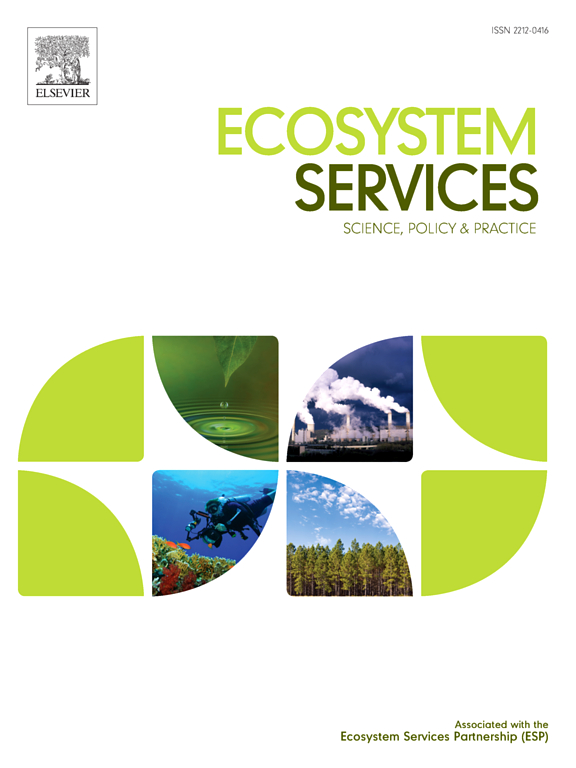Quantifying spatially explicit LCA midpoint characterization factors to assess the impact of specific farming practices on ecosystem services
IF 6.6
2区 环境科学与生态学
Q1 ECOLOGY
引用次数: 0
Abstract
The Life Cycle Assessment (LCA) methodology is a scientifically sound tool, endorsed by the European Commission, for conducting environmental assessments. Despite its standardized approach, certain areas require improvement, particularly concerning impacts on ecosystem structure, function, and associated ecosystem services. Given the significant pressure of agriculture on global ecosystems, research has attempted to establish characterization factors (CFs) that reflect the impact of agricultural practices on ecosystem services. However, the current CFs lack precision and are unable to differentiate between the various types and intensities of agricultural management. This study aims to contribute to the evolving LCA field by introducing novel CFs that allow for the assessment of the impacts and benefits of growing wheat under different agricultural practices on three ecosystem services: water purification, soil erosion control, and carbon sequestration. Spatially explicit, nonlinear models (InVEST and RothC) were used, with the Galician region of northwestern Spain as the spatial setting. The quantified CFs indicated that wheat cultivated with conventional tillage, straw removal and without cover crop exhibited the least favorable outcomes in terms of ecosystem service supply, specifically water purification (13.29 kg N·ha−1·y-1), soil erosion control (11.71 t soil·ha−1·y-1), and carbon sequestration (45.41 t C·ha−1·y-1). In contrast, the combination of conservation tillage, straw return and cover crop resulted in the highest ecosystem services gains (−0.46 kg N·ha−1·y-1, 2.64 t soil·ha−1·y-1, 7.05 t C·ha−1·y-1, respectively). The geographical specificity of the CFs presented here, combined with the detailed classification of agricultural land use, offers essential insights into the potential gains and losses of ecosystem services resulting from various farming practices. This information can assist industry stakeholders and policymakers in making well-informed agricultural management decisions, and in developing strategies that prevent unintended environmental burden shifting.

量化空间显式LCA中点特征因子以评估特定耕作方式对生态系统服务的影响
生命周期评估(LCA)方法是一种科学可靠的工具,得到欧洲委员会的认可,用于进行环境评估。尽管采用了标准化的方法,但某些领域需要改进,特别是在对生态系统结构、功能和相关生态系统服务的影响方面。鉴于农业对全球生态系统的巨大压力,研究试图建立反映农业实践对生态系统服务影响的表征因子(CFs)。然而,目前的CFs缺乏准确性,无法区分农业管理的各种类型和强度。本研究旨在通过引入新的CFs来评估不同农业实践下种植小麦对三种生态系统服务(水净化、土壤侵蚀控制和碳封存)的影响和效益,从而为不断发展的LCA领域做出贡献。以西班牙西北部的加利西亚地区为空间背景,使用空间明确的非线性模型(InVEST和RothC)。量化CFs结果表明,常规耕作、秸秆去除和不覆盖的小麦在生态系统服务供应方面表现最差,特别是水净化(13.29 kg N·ha−1·y-1)、土壤侵蚀控制(11.71 t soil·ha−1·y-1)和碳固储量(45.41 t C·ha−1·y-1)。相比之下,保护性耕作、秸秆还田和覆盖作物组合的生态系统服务收益最高(分别为- 0.46 kg N·ha -1·y-1、2.64 t土壤·ha -1·y-1、7.05 t碳·ha -1·y-1)。本文介绍的生态系统的地理特殊性,结合农业用地的详细分类,为了解各种耕作方式带来的生态系统服务的潜在收益和损失提供了重要的见解。这些信息可以帮助行业利益相关者和决策者做出明智的农业管理决策,并制定防止意外环境负担转移的战略。
本文章由计算机程序翻译,如有差异,请以英文原文为准。
求助全文
约1分钟内获得全文
求助全文
来源期刊

Ecosystem Services
ECOLOGYENVIRONMENTAL SCIENCES&-ENVIRONMENTAL SCIENCES
CiteScore
14.90
自引率
7.90%
发文量
109
期刊介绍:
Ecosystem Services is an international, interdisciplinary journal that is associated with the Ecosystem Services Partnership (ESP). The journal is dedicated to exploring the science, policy, and practice related to ecosystem services, which are the various ways in which ecosystems contribute to human well-being, both directly and indirectly.
Ecosystem Services contributes to the broader goal of ensuring that the benefits of ecosystems are recognized, valued, and sustainably managed for the well-being of current and future generations. The journal serves as a platform for scholars, practitioners, policymakers, and other stakeholders to share their findings and insights, fostering collaboration and innovation in the field of ecosystem services.
 求助内容:
求助内容: 应助结果提醒方式:
应助结果提醒方式:


